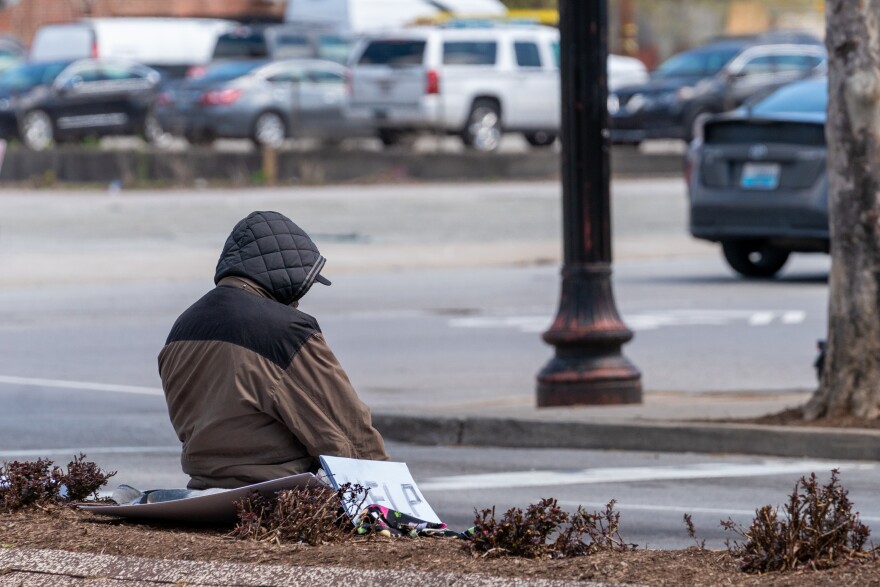Local nonprofit VOCAL-KY opened a drop-in center in February this year at its Old Louisville location. It’s a grassroots advocacy nonprofit dedicated to ending mass incarceration, homelessness and the AIDS epidemic.
Since then, the center has seen many unhoused people find refuge at the drop-in center — averaging 80 people every day, said Jennifer Twyman, organizer at VOCAL-KY.
“Our couches are a hot commodity because it's somewhere to lay down for the four hours that we're open and sleep, because out there, it's too dangerous to sleep,” she said.
Twyman said she’s grateful to be able to support people experiencing homelessness and provide them resources, especially during rainstorms, tornado warnings and other unexpected weather events. But their headquarters isn’t technically a shelter.
“We have a pretty big space for a drop-in center. We could have people sleep in here at night, but we don't have the staffing capacity to make that happen, like during emergency situations. We don't even have staffing capacity to be open five days a week at this point in time,” she said.
Increased extreme weather
When a wind chill below 35 degrees or a heat index above 95 degrees occurs, Operation White Flag, a Metro Government program coordinated by the Coalition for the Homeless, goes into effect. Shelters fly white flags warning people experiencing homelessness to get indoors.
But during sudden weather events like thunderstorms and high winds, people experiencing homelessness often have a hard time finding shelter space. Shelters and service providers are feeling the strain as more days become white flag days.
Due to climate change, parts of Kentucky will experience days when the heat index reaches 125 degrees or higher in the next three decades, LPM News previously reported, and the state is also likely to experience more flooding in the coming years.
Currently, the city has two shelters participating in Operation White Flag: Wayside Christian Mission and Salvation Army, both overnight shelters. Previously the city had three participating shelters, but St. Vincent de Paul — a men’s-only shelter — is not a white flag shelter this winter.
In an email, Aaron Selbig, communications coordinator at Louisville Metro Office of Resilience and Community Services, said it was due to the shelter undergoing major renovations.
Twyman said VOCAL-KY hopes to find more funding for staff, security and wraparound services, so they don’t have to turn people away during extreme weather.
“And then you take into consideration all the change, different changes in weather and unpredictability, and the city only looking at the cold weather and the hot weather instead of, like, torrential downpours and tornadoes and windstorms. For folks living outside, that’s more dangerous,” she said.
Money is just one barrier
Last month, Louisville Mayor Craig Greenberg announced $1.1 million in homeless initiative grant funding to provide case management and emergency shelter services during inclement weather.
The $1.1 million is divided among eight organizations that help people experiencing homelessness in the city – Hope Village, St. Vincent de Paul, Southwest Family Ministries, St. John Center, UP for Women and Children, Volunteers of America Mid-States, Wayside Christian Mission, and Wellspring.
Natalie Harris, executive director of the Coalition for the Homeless, said the city needs to invest in more short-term and long-term shelters as unexpected weather events grow more common. Part of that, she said, could be the city revisiting and expanding the criteria for what triggers Operation White Flag. Harris said she observed there were prolonged white flag days during this year’s heatwave.
“I do think that going from calling the day according to the weather to a ‘We're going to have additional space during these periods’ is a better one,” she said, referring to her desire for fixed times the city would run white flag operations.
She said that would help city agencies, participating shelters and other service providers in Louisville prepare for extreme weather events. She also wanted the city to streamline its licensing process for shelters, and make it easier for faith organizations and overnight shelters to get adequate funding to serve communities experiencing homelessness.
“It used to be that for every bed stay, the shelters only got $5 from the city per bed, and now they get $10. When we last looked at their actual cost, it was about $22 a bed. So they [the shelters] are still supplementing at least half of the cost of having additional people in their space,” she said.
The Community Care Campus, which broke ground last month, is set to open at the end of 2027. The city said in the meantime, they plan to have an emergency shelter for families ready by the end of this year.
Harris said she’s usually advocated for more affordable housing and housing solutions over shelters, but she’s changed her strategy.
“But we've gotten so far behind in producing housing that it's just unconscionable to leave people outdoors. And, so that's what we really need. We need more long-term shelter, and most of the shelter providers in the city have seen very little increase in funding,” she said.





